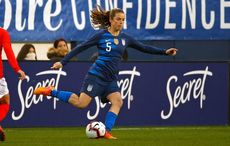When the Boston Celtics drafted Avery Bradley with the 19th pick of the 2010 draft, they acquired a developmental 19-year-old guard with more question marks than answers. Bradley had played point guard at Texas, but his inability to run an offense or be an impact scorer meant that his position amongst his professional piers was unclear.
After being drafted, Bradley spent much of his first season in the D-League refining his talent. His first season in Boston amounted to just 31 games on the active roster, with 5.2 minutes, .5 rebounds, .4 assists, .3 steals and 1.7 points per game. He was never really involved unless the game had already been decided and was not part of the regular rotation. As a rookie, he simply wasn't ready to be effective at this level and the Celtics didn't have a place for him to play.
An off-season that saw the league's players locked out threatened to quell any development that Bradley had established in his first season. Being that he was only one year in the league at that stage, Bradley had no choice but to look for work during the lockout and landed in Jerusalem. In just three games with the team, he scored 13.7 points per game before the NBA eventually reached an agreement with the Players' Union to pick up where they had left off.
The Celtics had essentially no pre-season before the regular season started in late December. Bradley was a part of the active roster, but his playing time was determined by how he initially did in games. He managed just 22 minutes total during the team's first four games of the year and didn't score a single point with just two rebounds and one assist. The then 21 year old was hesitant and lacked the composure/confidence to play at this level. That wasn't a real knock on him, because he was still a developing player who was only finding his way forward in a league that demanded much more of him than he had ever achieved.
Bradley played in spurts over the next month. A high of 23 minutes against the New Jersey Nets when he scored 23 points put Bradley on the map in early January, but that display was followed by just 35 minutes combined in the team's next five games.
The player who was labelled a combo-guard, but realistically still hadn't found any kind of comfort level at either spot, was both hurt and helped by the shortened NBA season. With a roster of veterans, the Celtics couldn't continually rely on their starters throughout the whole season. That meant, there were times when Bradley was going to get opportunities to play significant minutes in lieu of getting that invaluable practice time of previous seasons.
On January 20th, Bradley's first chance came.
Rajon Rondo's sprained right wrist meant that the Celtics needed a starting point guard against the Phoenix Suns. Bradley couldn't replace Rondo and wouldn't be able to on the offensive side. The Celtics had no other options however. No veteran guards were on the roster and of the youngsters the Celtics had, Bradley was the most experienced. The Celtics would lose the game, but they would also finally get the first extended look at what their young guard promised for the future. In 33 minutes, he only scored 10 points, but did so on 5-9 shooting. He didn't run the offense, so only had one assist, but forced three turnovers and limited Steve Nash to 11 points and nine assists. Relatively low numbers for a player of his caliber at the time.
Just two nights later, Bradley would continue in Rondo's place as the starting point guard. However, this time the struggles of youth would rear their heads. Bradley played a team-high 41 points and had seven assists with six rebounds, but he also shot 1-8(1-4 free throws) and had six turnovers. Bradley helped the Celtics to a win over the lowly Wizards with a +11 rating, but his offensive game appeared to not have improved at all since his college days at Texas.
His potential as a basketball player was there, but his limitations offensively would likely limit him to a role player on an average team if they didn't drastically improve.
As Rondo recovered from his injury and slowly brought himself back to 100 percent, Bradley's minutes would continually decline until the 9th of February when he wouldn't feature at all against the Los Angeles Lakers. Bradley was back to being a bit-part player fighting for minutes based on his early impact in games. The Celtics' struggles as a team weren't pushing head coach Doc Rivers in his direction at the time either.
The signing of Keyon Dooling, a veteran combo-guard, relegated Bradley even further down the pecking order. Yet, another Rajon Rondo suspension vaulted him back into the starting lineup against the Dallas Mavericks in late March again. This time Bradley's offensive output was respectable and his overall performance was relatively impressive with Rondo sitting out for two games, the second against the Oklahoma City Thunder. However, the Celtics lost both games convincingly.
A two game spurt was all that it would be this time. Bradley was almost immediately relegated back to being a bit-part player fighting for minutes and playing exclusively against inferior teams. Outside of a 22 minute display against the Portland Trailblazers, Bradley wouldn't crack 20 minutes on the court in a single game again until the 25th of April. Except this time when Bradley went into the lineup, everything was different.
Bradley wouldn't be relegated back down the totem pole again. Ray Allen, not Rajon Rondo, was injured this time with a sore ankle, so not only was he playing with Rondo, he was starting for the first time at shooting guard. Offensive struggles didn't exist, no turnovers marred his play and he hit every single free throw on his debut. Bradley was playing off the ball, but most importantly he was on the court...comfortably.
With Allen's sudden loss, Bradley was thrust into the starting lineup for the second time against the Washington Wizards. The opposition was the only thing familiar about his two 'debuts'. Bradley played 40 minutes, more than anyone else on the team. He scored 23 points, more than anyone else on the team. He shot over 55 percent from the field, more than anyone else on the team. He attempted and made four free throws, as much as anyone else on the team. He had just one assist, three rebounds and one steal, but he also had no turnovers and limited John Wall to 12 points on 5-17 shooting and nine assists.
This time Bradley's newfound time on the court wasn't met with looming question marks, it was engulfed in excitement. Bradley's problem wasn't that he couldn't be an effective offensive player, his problem was that he wasn't comfortable fitting into Rondo's role on a veteran team at such a young age. Bradley's skill-set is much better suited to being a shooting guard, even though he played point guard in college, and he immediately became an ever-present in the starting lineup from that point forward.
Ray Allen's absence allowed Bradley to play 40, 40, 43 and 38 minutes before he returned. Once Allen returned, he usurped Bradley for his first game back, but was pushed back into a sixth man role to accommodate the youngster.
Over the final month of the regular season, Bradley was not only a starting shooting guard for the Celtics but a pivotal piece of their playoff push. He averaged over 15 points per game in the month of April and shot 52 percent from the field and 54 percent from behind the 3-point line. But his statistical production wasn't what caught the eye. As Bradley's confidence grew, his comfort followed. When he found an adequate level of comfort, his aggression ratcheted to new heights. Bradley was routinely getting in the face of the oppositions' best scorers and forcing them into mistakes and tough shots.
Bradley showed a sign of things to come during a 115-107 victory over the Miami Heat, as he harassed Dwyane Wade all night to force him into a 9-21 shooting night. Once the playoffs began, Bradley stuck in the lineup despite battling shoulder issues. He helped the Celtics through the first round, but by the time they took the Miami Heat to a seven game series in the Championship round, his season had already been ended by a severe shoulder injury. Bradley's loss was seen as a major factor in deciding the outcome of a very close series.
A sophomore season that stuttered for Bradley came to a sudden close. His shoulder injury was so bad that it carried into this season and prevented him from playing the first two months of the season. Celtics fans had no idea if this latest sudden stop that had followed a fast start for Bradley was going to be the final one to decide his career. How he responded to this latest setback was likely going to define him, because he had failed to establish any kind of longevity at this level. Yes, he had been excellent for six weeks at the end of the season, but he had been excellent in shorter spurts before then too. Bradley's career was repeatedly getting caught on the tracks and it was time for it to either push through to speed away or give up and fall by the wayside.
Fortunately for Celtics fans, Bradley has emerged into a basketball player. A very impressive basketball player who has shown leadership, commitment and the confidence to kick his career onto the next level with the very best in the game.




Comments